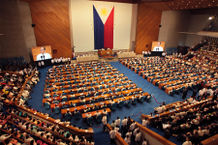Congress of the Philippines
![]() Country ● History ● Organizations ● Citizens ● Presidents ● Governments ● Congresses ● Parties ● Military
Country ● History ● Organizations ● Citizens ● Presidents ● Governments ● Congresses ● Parties ● Military ![]()
Government of Philippines
| ||||||||||||||
The Congress of the Philippines (Filipino: Kongreso ng Pilipinas) is the national legislative branch of the Philippines.
Each congress convenes every 27th of the month and consists of the duly elected Speaker, Deputy Speaker and members of Congress.
History
Initially, members of Congress were divided accordingly to the 4 regions of the Philippines, with each of the regions having 9 representatives plus 4 wildcard winners. However, in September 2012, a new voting system was implemented by the eRepublik Administrators. After the implementation of a party-list proportional representation voting system in September 2012, congress is usually composed of 40 Congress members.
In the new election system, voters are required to vote for the political party list, not the candidates themselves. However, the candidates are still required to submit their candidacy in order to be eligible for the election. The top 5 political parties in the country are only eligible for the vote. The percentage of seats of the political parties is determined by the percentage of votes received by the political party. If ever a party has received enough percentage of votes but is lacking a sufficient number of seats due to a lack of candidates, the remaining vacant seats are disregarded. With this, the 40 seats available and up for election are not always assured to be filled after the results have been announced.
Having the current election system in place, the equality of representation from the country's regions is now dissolved.
- Congress of the Philippines 2009
- Congress of the Philippines 2010
- Congress of the Philippines 2011
- Congress of the Philippines 2012
- Congress of the Philippines 2013
- Congress of the Philippines 2014
- Congress of the Philippines 2015
- Congress of the Philippines 2016
- Congress of the Philippines 2017
- Congress of the Philippines 2018
- Congress of the Philippines 2019
- Congress of the Philippines 2020
- Congress of the Philippines 2021
- Congress of the Philippines 2022
- Congress of the Philippines 2023
- Congress of the Philippines 2024
List of congresses
2009
| 2009 | |||
|---|---|---|---|
| Congress | Election | Composition | Seats |
| 1st Congress | 25 February 2009 |
Government (16)
Opposition (25) |
41 |
| 2nd Congress | 25 March 2009 |
Government (29) Opposition (10) |
39 |
| 3rd Congress | 25 April 2009 |
Government (19) Opposition (22) |
41 |
| 4th Congress | 25 May 2009 |
Government (27) Opposition (14) |
41 |
| 5th Congress | 25 June 2009 |
Government (21) Opposition (19) |
40 |
| 6th Congress | 25 July 2009 |
Government (38) Opposition (2)
|
40 |
| 7th Congress | 25 August 2009 |
Government (30) Opposition (11) |
41 |
| 8th Congress | 25 September 2009 |
Government (19) Opposition (22) |
41 |
| 9th Congress | 25 October 2009 |
Government (28) Opposition (12) |
40 |
| 10th Congress | 25 November 2009 |
Government (28) Opposition (12) |
40 |
2010
| 2010 | |||
|---|---|---|---|
| Congress | Election | Composition | Seats |
| 11th Congress | 25 December 2009 |
Government (8)
Opposition (33) |
41 |
| 12th Congress | 25 January 2010 |
Government (22) |
22 |
| 13th Congress | 25 February 2010 |
Government (9)
Opposition (25) |
34 |
| 14th Congress | 25 March 2010 | ||
| 15th Congress | 25 April 2010 | ||
| 16th Congress | 25 May 2010 | ||
| 17th Congress | 25 June 2010 |
Government (41) |
41 |
| 18th Congress | 25 July 2010 |
Government (20) Opposition (12)
|
32 |
| 19th Congress | 25 August 2010 |
Government (16)
Opposition (25) |
41 |
| 20th Congress | 25 September 2010 |
Government (20)
Opposition (21) |
41 |
| 21st Congress | 25 October 2010 |
Government (9) Opposition (32) |
41 |
| 22nd Congress | 25 November 2010 |
Government (26) Opposition (7)
|
33 |
Leadership
On Day 602, President Ariel David Buena suggested creating Speaker and Deputy Speaker positions in order for the Congress to be organized. The next congress (Sixth Congress), the positions were made official and they elected the first Speaker and Deputy Speaker of the Philippine Congress. [1]
Speaker of Congress
The Speaker of the House will be responsible for:
- Setting the agenda of the Philippine Congress.
- Moderating Congress debates and discussions (telling people to shut up when they get too noisy or irrelevant)
- Next month, the Speaker will be the one to create this nomination thread, the Congress sign-in thread, as well as the article instructing newly elected Congress members on what to do.
- Telling when Congress can make 'lulz' proposals and when they can't, and what kind.
- Make rules and guidelines for making proposals and how to vote on them.
- Maintain a voting record.
- Update the public on Congress activities through articles.
- Keep Congress members happy.
The Speaker after the expiration of his/her term shall continue to serve in a hold-over capacity until a new Speaker shall have been elected. The extension shall not, however, exceed 5 days.
In exchange for the dutiful dispensation of these responsibilities, the Speaker will be addressed directly as "Mr. Speaker, Your Honor", and otherwise will be addressed in the third person. He will also be loved and adored by the Filipino people.
- The term of the Speaker of the House shall last for one month along with his/her term as a Congress member.
- Rules for the impeachment of the Speaker shall follow the same rules as the impeachment of the President.
Deputy Speaker of Congress
The Deputy Speaker, (Officially Pro-Tempore Speaker), of the House will be responsible for assisting the Speaker on all the tasks stated above, and other duties and functions as may be determined.
- The term of the Deputy Speaker of the House shall last for one month along with his/her term as a Congress member.
References
| |||||
| |||||||||||||||||||||||||||||||||||||||||||||||||||||



